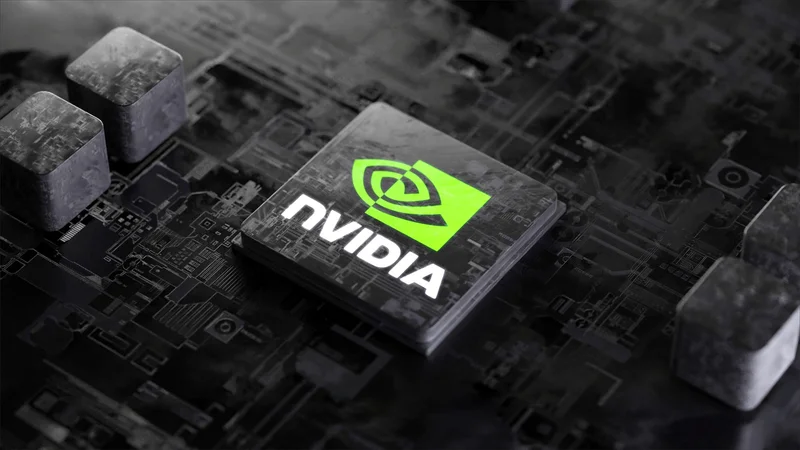Nvidia's AI Chip Push: Stock Price, Competitors, and What's Driving the Hype
Google's AI Gambit: Ironwood or Fool's Gold?
Google's latest unveiling of its seventh-generation Tensor Processing Unit (TPU), Ironwood, is generating buzz, but let's dissect the claims. The core argument is that Ironwood is designed to wrest AI dominance from Nvidia. Google touts a fourfold performance increase over the previous generation. Anthropic, the AI startup, is allegedly planning to use up to 1 million Ironwood chips. These are big numbers, but what do they actually mean?
The cloud market is currently dominated by Amazon Web Services and Microsoft Azure. Google Cloud is playing catch-up. Their third-quarter revenue of $15.15 billion represents a 34% year-over-year increase, which sounds impressive until you compare it to Microsoft Azure's 40% growth, or even AWS's 20%, which is growing from a much larger base. Google's claim of signing more billion-dollar cloud contracts in the first nine months of 2025 than in the previous two years combined is a positive sign, but it's still just a claim. We need to see these contracts and their specific revenue impact to assess the real picture. (Contract details are curiously absent.)
The Nvidia Hurdle
Nvidia's recent milestone of hitting a $4 trillion market cap is a stark reminder of the challenge Google faces. Nvidia essentially is the AI hardware market right now. Google is betting that custom silicon, like Ironwood, can offer superior efficiency, performance, and cost for specialized AI workloads. This is a reasonable bet, but it's a long game. Google takes aim at Nvidia, rolls out its most powerful AI chip
The comparison between GPUs (Nvidia's bread and butter) and TPUs (Google's custom chips) is crucial here. GPUs are general-purpose processors, while TPUs are designed specifically for machine learning tasks. This specialization should translate to better performance per watt and potentially lower costs for specific AI applications. But "should" is the operative word.
Google's CEO, Sundar Pichai, stated that they are seeing substantial demand for their AI infrastructure products and that it's a key driver of growth. To meet this demand, Google raised its capital expenditure forecast for 2025 to $93 billion (a substantial increase from the earlier $85 billion). It’s a bold move, signaling serious commitment.

Here's the part of the report that I find genuinely interesting: Anthropic's planned use of 1 million Ironwood chips. That's a massive commitment from a single AI startup. It suggests that Anthropic sees a significant advantage in using TPUs over GPUs, at least for their specific models (specifically, the Claude language model). But how much will Google subsidize this?
The Million-Chip Question
The question is, what are the economics behind this million-chip deal? Is Anthropic getting a sweetheart deal to showcase the capabilities of Ironwood? Or is there a genuine, demonstrable cost advantage for Anthropic in using TPUs at that scale? The answer to that question will determine whether Ironwood is a viable competitor to Nvidia in the long run, or merely a pet project for Google.
Let’s look at the bigger picture. The race between Google, Microsoft, Amazon, and Meta to dominate AI infrastructure is intensifying. All of them are investing heavily in custom silicon. This suggests that the future of AI hardware is not a one-size-fits-all market dominated by GPUs, but a fragmented market with specialized chips optimized for specific workloads.
The risk, as I see it, is that Google might be overspending on a solution that's only optimal for a narrow set of AI applications. Nvidia, with its broad range of GPUs and its established ecosystem, has a significant advantage in terms of flexibility and developer support. Google needs to convince developers that TPUs are worth the investment in terms of time and effort. Google’s claim of making its cloud platform “cheaper, faster, and more flexible” is a good start, but it needs to be backed up with concrete data and compelling case studies.
Google's AI Math Doesn't Quite Add Up
Google's Ironwood TPU represents a credible threat to Nvidia's AI dominance, but the financial justification remains opaque. Until the economics of large-scale TPU deployments become clearer, Nvidia's position looks secure.
-

Warren Buffett's OXY Stock Play: The Latest Drama, Buffett's Angle, and Why You Shouldn't Believe the Hype
Solet'sgetthisstraight.Occide...
-

The Great Up-Leveling: What's Happening Now and How We Step Up
Haveyoueverfeltlikeyou'redri...
-

The Business of Plasma Donation: How the Process Works and Who the Key Players Are
Theterm"plasma"suffersfromas...
-

NJ's ANCHOR Program: A Blueprint for Tax Relief, Your 2024 Payment, and What Comes Next
NewJersey'sANCHORProgramIsn't...
-

Zcash's Zombie Rally: The Price Prediction vs. What Reddit Is Saying
So,Zcashismovingagain.Mytime...
- Search
- Recently Published
-
- Blue Owl: Capital, Stock, & Private Credit Dynamics
- Switzerland: Time Zones, Major Hubs, & Key Logistical Data
- Cook County Treasurer: property taxes, bills, login, and how to pay
- Alibaba Stock: What's Driving the Price Today
- CoreWeave (CRWV): What's Driving Its Stock and Analyst Targets
- ANyONe Protocol: What it is and the real story
- Avicii: How AI is Continuing His Musical Legacy
- Bitcoin: What the Shutdown's End Means for the $112K Forecast
- The AI Debt Boom: Analyzing the Real Financial Risk
- Zcash's Historic Surge: Privacy, Potential, and What's Next
- Tag list
-
- carbon trading (2)
- Blockchain (11)
- Decentralization (5)
- Smart Contracts (4)
- Cryptocurrency (26)
- DeFi (5)
- Bitcoin (30)
- Trump (5)
- Ethereum (8)
- Pudgy Penguins (5)
- NFT (5)
- Solana (5)
- cryptocurrency (6)
- XRP (3)
- Airdrop (3)
- MicroStrategy (3)
- Stablecoin (3)
- Digital Assets (3)
- PENGU (3)
- Plasma (5)
- Zcash (7)
- Aster (4)
- investment advisor (4)
- crypto exchange binance (3)
- SX Network (3)
